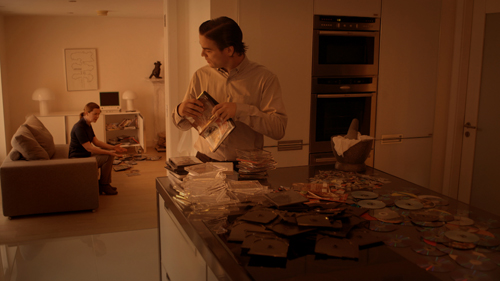Loop: City Screen with Damer House Gallery, Barcelona, May, 2017 – Include Me Out of the partisans manifesto
The desire to look back in time always seems to be associated with a certain nostalgia; a feeling of slight pleasure that stems from the recollection of memories. However, from a historical perspective, the act of calling up a bygone past discloses a precise intention that reaches beyond the simple feeling of longing: that of tracing a temporal development that is at once ontological, political and cultural.
Yet, in a fast-forward society that tends to evolve according to a frenetic pattern, looking back results in an essential “shrinking of time” – in the words of German sociologist Hartmut Rosa –, that in fact opposes the linear consequentiality of past, present and future tenses . As a result of this constant rush towards “the new” (exemplified by hectic technological progress and the annihilation of cultural knowledge), attempts to look back in time are immediately dismissed as obstacles. While individuals grow accustomed to desiring newer and more disposable futures, they grow oblivious to the past.
But how are things really supposed to move forward, if we are constantly estranged from ‘what is gone’ and consistently obsessed with ‘what is going to be next’? By translating these questions in the realm of artistic production, on the occasion of its 15th anniversary LOOP will wind the clock back and revisit the early days of video art. In accordance with the belief that a retrospective look not only is key to a well-rounded history, but also a means to shed light upon the present, the upcoming festival will then single out a series of proposals by pioneer practitioners that, challenging as they were at the moment of their creation, still maintain a critical interest today.
The selection will so emphasize the radical aspects of video as it entered the progress of art: its always contentious relationship to television, and the shifting appearance of its formats, on one hand (from a portable, cheap and easy to manage tool to its expansion in the likenesses of installation); its relationship to present time and its communitarian facet, on the other (respectively declined as documentary and live recordings of performance, or as radical and political manifestoes defining a counterculture).
Coming into play in the mid-‘60s, when portable recording devices were being launched in the US, video promptly entered the range of available artistic media. First promoted by the dominant industry of television, during the ‘70s and ‘80s it imposed itself as an independent tool in the constellation of the so-called “new media”. Subject to the rapid development of artistic forms, video underwent constant transformation: over a period of four decades it indeed not only adapted to the rapid shifts in technological production, but its manifold uses also testified to distinct social and political climates.
Brief as it may be compared to the history of other mediums, the trajectory and evolution of video both in Spain and abroad is of considerable interest. Beyond disclosing a wistful affection for the past, LOOP’s retrospective posture will reflect precise intentions that could be defined as: the will to rewind, to pause, to slow down in order to allow for a contemporary archaeology of the present; the desire to look back in order to revive past video works left behind by the medium’s rapid evolution; the possibility to interpret current production in the light of early works and, ultimately, to provide the platform’s longstanding engagement with the moving image with an even stronger background.
___
The development of the curatorial proposal stemmed from a joint collaboration between Eugeni Bonet and Antoni Mercader, both specializing in the study of new media and audiovisual art and co-authors of Entorno al video (1980), the first Spanish publication ever dedicated to the medium.
Carolina Ciuti
Festival Coordinator
http://loop-barcelona.com/about-loop-festival/loop-festival-2017/
